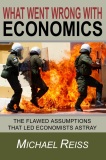I think it is well known that after a big asset bubble bursts, there often follows a recession. But why should that be? One could argue that, the bubble bursts - a bunch of people lose some money - after a few tears, its back to work and we all continue as before. Why doesn't that happen? This is what I think...
In this earlier post I explain how the price P people are willing to pay for goods G is a function of how "painful" it is to have our monetary wealth reduced by P. Now at the peak of a bubble, there will be a lot of people who (incorrectly) think that their current monetary wealth (e.g. their cash + their perceived sale value of their assets) is very high. So, correspondingly, the perceived pain in having their wealth reduced by P is low. Therefor they will merrily pay P for that G. Or to put it another way, why bother thinking long and hard about buying that new car because I'm rich as I'm the owner of a valuable house that I can use to fund my retirement... "Heck - I barely ever need to save ever again!".... Now comes that bubble bursting - the house never was that valuable - it was all a charade - the houses were only "valuable" because people thought that their price was going to continue to rise forever - the fundamental, true, value was way lower. Now let's reconsider that price P. Again we have to consider how much "pain" is caused by the loss of wealth, P. Now its all different - the same P is looking like a far bigger fraction of your existing wealth. The size of that financial buffer between where you are now, and poverty, is going to have shrunk dramatically. Therefor the size P that you are willing to pay for G has correspondingly shrunk dramatically. Or in other words it has become more painful to depart with your money... or... you are going to try and spend less if at all possible. Now this is not much of a problem globally if it was only a relatively small group of people that were duped by the bubble. The overall reluctance to spend will be small. The real trouble comes if A) a large number of people got duped and B) the size of the bubble was large, i.e. the peak price of the asset was way bigger then the logical price. If many people got stung badly by the bubble-burst then the global reluctance to spend can trigger a self fulfilling cycle or recession (as described here). This is what is happening right now - a huge number of people in many countries were tied up in this bubble, so there is correspondingly, a widespread reluctance to spend... and through self fulfilling feedback, the "widespread" reluctance has grown to an almost universal reluctance.
Thursday, 12 March 2009
Subscribe to:
Post Comments (Atom)




No comments:
Post a Comment